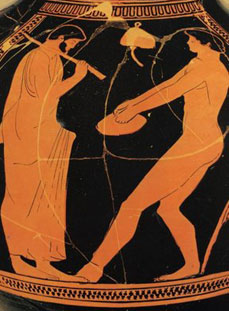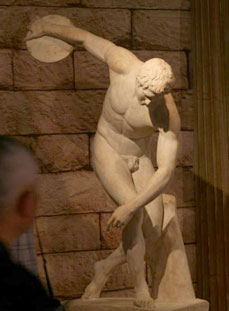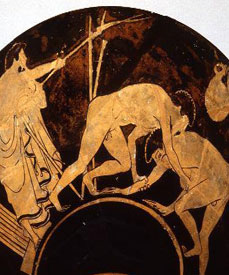
TRAINING AND TRAINERS
The top athletes in ancient times were professionals, competing in many games and certainly making a good living from the contests. Like their modern counterparts, they trained extensively, adopted a serious regimen of exercise and diet, and sought out skilled trainers and coaches. On painted vases, scenes of the gymnasion often show cloaked and bearded trainers with forked sticks among the young nude athletes in training. We know of one famous Athenian trainer named Melesias, an aristocrat and personal friend of the poet Pindar. In Olympian Ode 8 he is credited with preparing athletes who won thirty victories. Just as today, the specialization of athletics was criticized as excessive and unhealthy. In his Republic, Plato described such training as designed only to increase brute strength and not desirable for citizen soldiers: "A proper training would produce courage; but if that element is overstrained, it naturally becomes hard and savage." In general, while the intellectuals tended to deplore the emphasis placed on athletics, the appeal of such competitions for the average citizen remained high.

ADMINISTRATION
When every four years the Athenians mounted the festival of the Great Panathenaea, they invited visitors from far and wide in Greece and beyond. Months prior to the games special ambassadors, called spondophoroi (=messengers), went forth to announce the festival to all the Greek states on the mainland as well as on the Italian peninsula, and, in the Hellenistic period, they traveled as far as the Persian Gulf and North Africa. In the 5th century B.C. the subject allies of Athens were expected not only to send a delegation to march in the procession, but also to contribute a suit of armor and a cow as offerings to Athena.
The Panathenaic festival was organized by a group of ten overseers called athlothetes (or "athlothetae" = sports administrators), who were appointed by lot, one from each tribe. According to the Constitution of Athens, "they hold office for four years: they administer the procession of the Panathenaia, the musical contests, the athletic contests, and the horse race; they are responsible for the making of the robe, and together with the council for the making of the vases, and they present the olive oil to the winning athletes." During the three years leading up to the festival they commissioned the prize amphoras from potters, collected the oil from the trees sacred to Athena, and supervised the weaving of a sacred robe to be presented to the goddess Athena. Inscriptions tell us that large sums of money were disbursed from Athena's treasury to these commissioners of the games.

THE PROGRAM
Inscriptions carved on stone blocks, or stelai (=blocks), enable us to reconstruct a fairly detailed program of musical, gymnastic, and equestrian events. The entire program probably lasted at least a week and proceeded from place to place in the city. During the first few days (in our necessarily hypothetical reconstruction) the musical contests would have been held in the odeion. On days four and five the stadium would have hosted the athletic events, first for boys and youths, then for men. The latter ended with a 40o-meter race in armor, an important contest that was the culminating event of the Olympic games. Colorful chariot displays in the Agora began the sixth day, which ended with horse races among members of the Athenian cavalry. On the seventh day the action moved to the hippodrome for the more serious (and lucrative) racing of the thoroughbred horses and chariot teams. The next-to-last day was reserved for competitions open only to Athenian citizens, the contestants being organized by tribe. The festival culminated with a grand procession to the Acropolis, the sacrifice of cattle, and lavish feasting.
